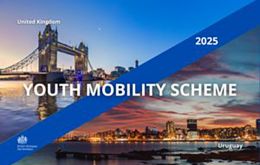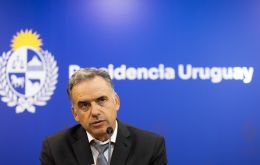MercoPress. South Atlantic News Agency
Uruguay
-
Wednesday, April 30th 2025 - 07:27 UTC
Youth Mobility Scheme for Uruguayan and British citizens starting 2025

In 2025, 500 British and 500 Uruguayan nationals aged 18 to 30 years old will be able to experience life and culture in each other’s country for up to 2 years, as established in the agreement that came into effect in both countries on 31 January 2024.
-
Tuesday, April 29th 2025 - 10:17 UTC
Two Uruguayans held under slave-like conditions rescued in Brazil

Two Uruguayans, a homosexual man and a trans woman, were rescued in Planura, in the State of Minas Gerais, Brazil, after years of slave-like conditions. Lured via social media with false job promises, they endured physical, sexual, and psychological abuse, including forced tattoos of their employers' initials. The man worked unregistered for nine years, while the trans woman, held for six months, suffered a stroke.
-
Monday, April 28th 2025 - 10:18 UTC
Uruguayan university study favors taxation on cigarettes

In Montevideo, a Universidad de la República (Udelaar) study projected that a 60% increase in cigarette taxes from 2025 to 2028 would reduce smoking by 19%, preventing 49,000 smokers, and increase tax revenue by 24%, aligning with World Health Organization (WHO) recommendations.
-
Saturday, April 26th 2025 - 10:49 UTC
Ancap back in the red after 5 years of Multicolor rule, Orsi says

Uruguayan President Yamandú Orsi announced Friday that the state-owned fuel company Ancap recorded a loss of US$ 118 million last year under the opposition government of Luis Lacalle Pou, contrasting with a US$ 41 million profit in 2019 when the country was headed by the late Tabaré Vázquez of the currently ruling Broad Front (Frente Amplio - FA).
-
Friday, April 25th 2025 - 10:35 UTC
Uruguay halts Neptuno water supply project for 90 days

The Uruguayan Government of President Yamandú Orsi and the Aguas de Montevideo consortium signed an agreement Thursday to suspend the Neptuno Project contract for 90 days. This temporary halt pauses the construction of the Arazatí water treatment plant to renegotiate terms established under the previous administration. A Torre Ejecutiva working group will review the contract to ensure a sustainable drinking water supply and institutional transparency.
-
Thursday, April 24th 2025 - 10:43 UTC
Montevideo's Carrasco Airport to reach top international standards

Montevideo's Carrasco Airport's international status will be upgraded to a Category III B Instrument Landing System (ILS) after an investment of more than US$ 20 million. The improvement will enable safer and more efficient operations in adverse weather conditions. Work has already begun on the alternate runway and will be extended to the main runway in June.
-
Thursday, April 24th 2025 - 10:35 UTC
Uruguayan Bishops Hold Mass to Honor Legacy of Pope Francis

Uruguayan bishops held a solemn mass on Wednesday at Montevideo’s Cathedral to honor the life and legacy of Pope Francis, who passed away on Monday at the age of 88. The ceremony drew around a thousand attendees, filling every seat and standing space in the historic church.
-
Tuesday, April 22nd 2025 - 20:04 UTC
Uruguay's Defense Ministry takes disciplinary measures in Cardama deal probe

Senior Uruguayan Navy officers, including former Commander-in-Chief Jorge Wilson, were handed down arrest sanctions for their roles in purchasing two ocean patrol vessels (OPVs) from Spain's Cardama shipyard, a company with no experience in that type of unit, and was also facing financial hardships.
-
Tuesday, April 22nd 2025 - 10:48 UTC
Uruguay's new Housing Minister to be sworn in Tuesday

Uruguayan President Yamandú Orsi picked Tamara Paseyro, previously the director of Social and Urban Integration at the Ministry of Housing and Territorial Ordering (MVOT), to become the new Minister of Housing, replacing Cecilia Cairo following her resignation amid a days-long scandal regarding unpaid taxes on her residence in Montevideo’s Pajas Blancas area.
-
Friday, April 18th 2025 - 10:59 UTC
Uruguay's housing minister resigns over unpaid taxes on her residence

Cecilia Cairo resigned as Uruguay's Minister of Housing and Territorial Planning on Thursday following controversy over her failure to regularize her house’s construction and update its real estate taxes for at least 20 years, making minimum payments incompatible with the residence's size. President Yamandú Orsi plans to accept her resignation through a formal note on Friday.
